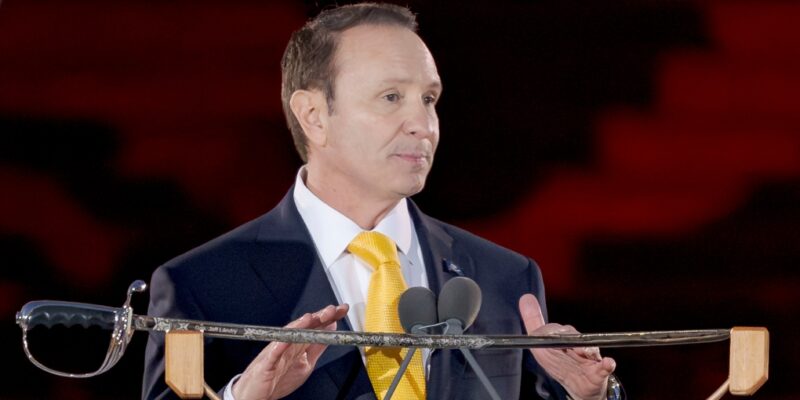Certainly Republican Gov. Jeff Landry gets to take a lot of credit for changes poised to alter significantly Louisiana’s fiscal structure. But he crossed the goal line after others had helped him down the field, some of whom no longer serve in government.
It took quite a bit of political capital investment for something of this magnitude, the biggest change in half a century, to be pulled off, and not all political leaders have the skill to do it. That may have been where over a decade ago GOP former Gov. Bobby Jindal came up short. As originally constituted, Landry’s plan looked at its core like Jindal’s – swapping income taxation for broader sales taxation and increasing the overall load on business – and became even closer when hiking the sales tax rate after broadening the sales tax shriveled substantially as did curtailing income tax breaks.
Jindal, however, threw in the towel rather quickly in the face of opposition, while Landry rolled with the punches and kept on the pressure. He had to reduce benefits enjoyed by individuals to appease corporate interests, although these were done in a way that benefits trickled down to individuals also with the exception of a few things like keeping the wasteful Motion Picture Production tax credit that benefits enormously only a few. What Landry ended with (technically still be to be signed into law by him and dependent upon passage of an omnibus constitutional amendment next spring) wasn’t nearly as promising as what he started with, but it is a considerable improvement over what currently is.
In this he enjoyed great aid from his Secretary of Revenue Richard Nelson, who was no latecomer to the party. In his four years in the House of Representative before running for governor but bowing out and endorsing Landry, Nelson hit repeatedly upon several aspects to the plan as introduced while in the House, such as eliminating the income tax (Landry’s plan was pitched as a way station towards this) and the film credit. Even though Nelson’s professional background had little to do with economics or finance, his pursuit of changing aspects of the state’s fiscal system while in the House and making it the centerpiece of his gubernatorial campaign, plus of course being of like mind with Landry on that, nabbed him the cabinet post and ran with abandon the handoff from Landry. Without his piecing it together, advocating across the state for it, and interfacing with legislators and lobbyists to push it into the end zone, it likely wouldn’t have made it across the goal line.
One final, perhaps the least recognized of the contributors, also deserves mention — the House Freedom Caucus. Last year, the collection of conservative lower chamber members concocted a budget plan, by spending less through diverting excess revenues to pay off unfunded accrued liabilities in pension accounts, that not only would have encouraged pay raises for educators but also likely would have caused a decrease in income taxes paid. Instead, Republican leaders actively worked against that plan, scuttling it, and in the process spewed derogatory comments about them.
A lot can change in 18 months. With many of the Caucus members still in the House or having moved on to the Senate and almost all backing Landry’s plan, not only did the income tax cuts come but also the shifting of dollars to pay down the UAL and trigger the educator pay raises. If they didn’t inspire especially the UAL swap portion of Landry’s plan, they certainly were helpful in passage of the whole package. And they lived to see the political bodies of their enemies float by, all of whom have been marginalized in power or ejected from office.
Advertisement
Advertisement

